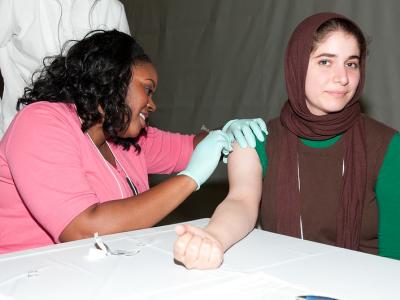Nov 14, 2011 (CIDRAP News) Against a backdrop of state, national, and international efforts to raise awareness about appropriate antibiotic use, the US Centers for Disease Control and Prevention (CDC) launched a new tracking system to monitor use of the drugs in hospitals.
Antibiotic use can lead to antibiotic resistance, which can increase the risk of hospitalization or lead to treatment failure in sick patients, according to the CDC. Previously, the agency was able to track antibiotic use only in doctor's offices.
CDC director Tom Frieden, MD, MPH, in a Nov 11 press release urged hospitals and other healthcare facilities to monitor antibiotics used in those settings. "This new system is a powerful tool that will enhance providers' ability to monitor and improve patterns of antibiotic use so that these essential drugs will still be effective in the years to come," he said.
The hospital antibiotic tracking system is a component of the CDC's National Healthcare Safety Network, which includes more than 4,800 hospitals. The system is voluntary, and 70 hospitals so far have implemented the system as part of a CDC-funded initiative with four health departments and their academic partners.
The system pulls data directly from pharmacy software vendors, which saves hospitals the time and cost of manual data entry, according to the CDC.
Arjun Srinivasan, MD, who heads the CDC's Get Smart for Healthcare program, told CIDRAP News that hospital infection control experts have requested a way of monitoring antibiotic use in their institution that isn't labor intensive. He added that the CDC's goal was to make the system useful for hospitals and realistic for pharmacy software vendors to work with.
He said the streamlined new system gives hospitals a way to benchmark antibiotic use across the institution and within individual departments, which can guide interventions designed to reduce antibiotic use or assess if current protocols are working. Srinivasan said hospitals will be able to compare themselves to other similar institutions.
The system will give hospitals usable data, he said. For example, if tracking finds high rates of broad-spectrum antibiotic use in a certain unit, managers can talk to practitioners to find out why. "This provides information that serves as a starting point," Srinivasan said.
It also gives the CDC information for benchmarking, which he said is helpful if done as a thoughtful first step.
Today is the first in a week-long "Get Smart About Antibiotics" campaign, an effort by the CDC and its partners to promote appropriate antibiotic use. Though awareness strategies over the last decade have shown documented improvement, the CDC says up to half of antibiotic prescriptions are still unnecessary.
The CDC said the campaign is part of a federal interagency task force on antimicrobial resistance, which will meet in Washington, D.C., this week to discuss the next steps toward meeting goals spelled out in the recently revised public health action plan for addressing the problem.
Some international groups are coordinating their antibiotic awareness campaigns this week, including the European Union and Canada.
The Society for Healthcare Epidemiology of America (SHEA), one of the CDC's Get Smart About Antibiotics week partners, said today that it will publish a special issue of its journal Infection Control and Hospital Epidemiology in April containing studies from around the world that advance the science and practice of antimicrobial stewardship programs.
SHEA also announced that in April it will substitute its regular annual meeting with a conference that includes a 2-day track devoted to the topic.
Sara Cosgrove, MD, SHEA board member and associate professor of medicine at Johns Hopkins University, said in the press release that healthcare professionals aren't sounding a false alarm about antibiotic prescribing.
"The threat of a return to a pre-antibiotic era has never been more real," she said. "We need to implement antimicrobial stewardship programs and interventions on a large scale to help preserve the antibiotics we have."
The Association for Professionals in Infection Control and Epidemiology (APIC) said it supports efforts to promote proper antibiotic use and is a partner in this week's events. It said antibiotic-resistant infections are likely to require longer and more costly hospital stays and have higher mortality rates. It said if first-line drugs don't clear up the infection, second- or third-line drugs may be even less effective, more toxic, and more expensive.
Russell Olmsted, MPH, APIC president, said in a press release today, "Empowering patients and healthcare providers to improve prudent and effective use of these life-saving medications is vital, as organisms with new mechanisms to resist their effects are increasing, while the number and range of new agents remain severely limited."
See also:
Nov 11 CDC press release
Nov 14 SHEA press release
Nov 14 APIC press release




















